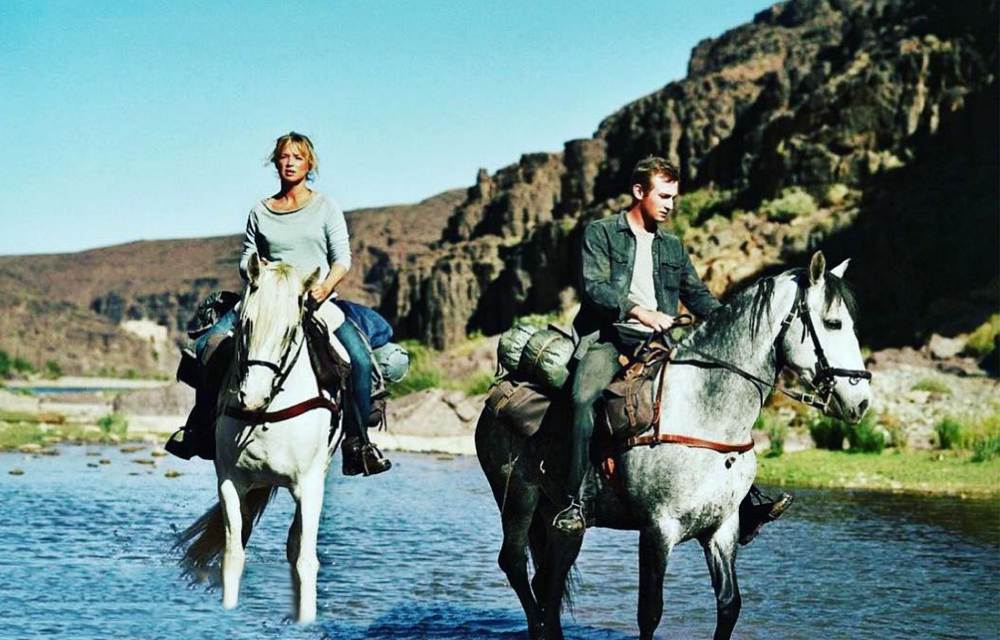Venice Film Review: ‘Keep Going’
By Guy Lodge
LOS ANGELES (Variety.com) – Intelligently barbed, emotionally naked chamber dramas about families in crisis are what we’ve come to expect from Belgian writer-director Joachim Lafosse. So when his latest, “Keep Going,” opens on wide, mighty-skied vistas of far-flung badlands, the effect is disorienting — at least, until his characters open their mouths, and it becomes clear that Lafosse’s brand of domestic claustrophobia has merely taken a remote, outdoorsy vacation. An earthy, surly neo-western built surprisingly around the fractious, semi-estranged relationship between a struggling single mother and her temperamental teenage son, this is a two-hander as unadorned and straight-ahead as the bare Kyrgyzstan steppes on which it takes place, acted with doughty fixity of purpose by Virginie Efira and Kacey Mottet-Klein.
Commercially, the international prospects for “Keep Going” — adapted from French author Laurent Mauvignier’s well-regarded 2016 novel “Continuer” — may be narrower than those for Lafosse’s last feature, the thorny, Bérénice Bejo-starring breakup drama “After Love.” Yet its accessible themes, sinewy visual grandeur and svelte 84-minute form should make it an easy enough sell to distributors. (Ditto Efira’s rising stock as a dramatic lead: She’ll be seen next year in the title role of Paul Verhoeven’s erotic historical epic “Benedetta.”) Following a low-key Venice Days premiere, “Keep Going” will steadily follow its title’s directive through the festival circuit.
Lafosse opens the film with zero setup or preamble, as we’re thrust directly into the middle of two French characters’ rugged Central Asian odyssey, and left to figure out, from passing asides and inferences, just how and why the hell they got there. When Jean-François Hensgens’s camera breaks from surveying the harsh background beauty to close in on the travelers’ sun-beaten faces, it’s clear they’ve been asking themselves the same question. Petite-but-tough Sybille (Efira) and her lanky, sulky son Samuel (Mottet-Klein) are traversing the scrubby, spectacular landscape on horseback, their attention fixed so rigidly on practical, in-the-moment challenges that their mutual terseness isn’t immediately recognizable as a deeper-rooted hostility.
Gradually, a fuller picture emerges, though hardly a kinder one. Sybille, having given birth to Samuel as a teenager, has been absent for much of his childhood; following a rupture in their already broken family unit, she has pooled all her resources into this rashly conceived trip, as a last-ditch attempt to forge a meaningful bond with her son before he slouches resentfully into adulthood. It may be too little, too late, for Samuel’s damage runs deep, and manifests in savage ways. Better with horses than with people, he has recently been expelled from school for assaulting a teacher, further motivating the trip; when he loses his cool with his mother, he fizzes on the edge of physical violence. Theirs is a volatile dynamic that makes the various external threats they encounter on their journey — some natural, some human — feel fleeting and secondary by comparison. When they’re at war, which more often than not, the awe-inspiring sweep of earth and many-weathered air around them may as well be their own living room.
Which is not to say the film’s robust Kyrgyz setting — in fact convincingly provided by the umber plains of Morocco — is merely an attractive embellishment to the action. Rather, stranding mother and son so far from any familiar comforts or defenses enables their rawest feelings to spill forth. Neither do the film’s classical western stylings amount to an empty, straight-backed pose. There’s something here of the genre’s concern with elemental moral conflicts and debts, with good and evil dueling within each character: Sybille may seem a conciliatory figure now, but there are evidently heavy reparations to be made on her part. All that, and those aforementioned stylings are pretty damn gorgeous: Lafosse and Hensgens shoot in the scorched autumn tans and searing blues of late John Ford, before an unexpected transition into snow-caked wilderness that may signal a colder snap to come in mother-son relations.
It’s only in this final act that “Keep Going” seems jittery and unconfident, racing through a sequence of key dramatic turns that barely leave Efira and Mottet-Klein — the latter, as ever, particularly impressive in his expression of inchoate adolescent emotion — time to credibly react. Lafosse enters his narrative in a no-nonsense hurry and aims to leave it the same way. Still, this pleasingly trim film could afford itself a few more breaths, even if Sybille and Samuel’s tortured, deep-feeling relationship was always going to exit proceedings unresolved. “We fight, and that’s something,” Sybille observes half-hopefully in her diary, well aware that wild horses couldn’t, and indeed can’t, drag these two together.

